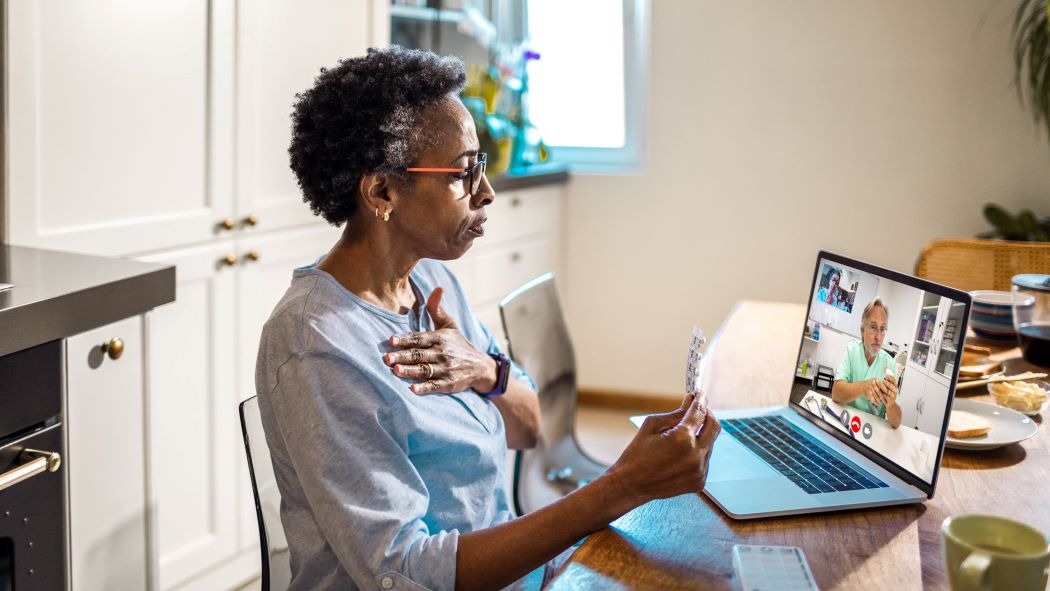
The COVID-19 pandemic, coupled with the rise of digital technology, is driving massive shifts in consumer preferences and demographics. These dynamics have prompted older adults, their loved ones, and the health care industry at large to rethink what care should look like for Americans 65+ going forward.
That was the topic of conversation during the "What Seniors Want" panel, at Oliver Wyman’s 2021 Health Innovation Summit, where industry experts gathered virtually for a session in which they discussed how health care needs for seniors will change over the next 10-20 years – in terms of preferences, characteristics, and health conditions. The experts spoke to what trends are on the horizon, and what elements of senior care will become table stakes in the future.
Seniors Today Vs. 10 Years Ago: What’s Different?
 According to Aparna Abburi, president of Medicare and CareAllies at Cigna (left), there are huge shifts in terms of how seniors live today vs. how they lived just 10 years ago. She sees it as an opportunity to think differently about “the role … [Cigna] can play in helping to ensure continuity of care, provider continuity, case manager continuity and [overall] continuity of the [customer] experience. For us it’s a … really big priority and focus.”
According to Aparna Abburi, president of Medicare and CareAllies at Cigna (left), there are huge shifts in terms of how seniors live today vs. how they lived just 10 years ago. She sees it as an opportunity to think differently about “the role … [Cigna] can play in helping to ensure continuity of care, provider continuity, case manager continuity and [overall] continuity of the [customer] experience. For us it’s a … really big priority and focus.”
Seniors are living longer (with more chronic conditions); they are more active; and they are traveling and very involved in their communities. They are also more digital savvy than their predecessors. “We’re seeing huge shifts over the last 10 years,” Cigna's Abburi said. “[For one], individuals are working longer.”
Indeed, research from the U.S. Bureau of Labor Statistics shows that that by 2024, the labor force will grow to about 164 million people. That number includes about 41 million people who will be ages 55 and older – of whom about 13 million are expected to be aged 65 and older.
Seniors (those who are 65+) have broad needs, Abburi added. Someone who is on the younger end of the demographic can have very different needs than an individual who is 80+. Social determinants of health (think: access to healthy food, housing, transportation, and more) also play a role in the individual needs of seniors, and must be taken into account.

The chart above looks at factors that impact overall health and well-being.
 Greg Marion, senior vice president of health products and services at AARP Services Inc. (right), says that today’s older population is far more informed than in years past.
Greg Marion, senior vice president of health products and services at AARP Services Inc. (right), says that today’s older population is far more informed than in years past.
“They are more aware of what it means to be well,” he said. “And they are more aware of their inertia. They don’t necessarily know how to get over it, and they don’t like to talk about it, but… realize they probably should be doing a lot of different things to be well.” And, he added, COVID-19 has only accelerated this awareness.
Gaps in Care Access, Navigation and Delivery
 Joanne Pike, chief strategy officer at the Alzheimer’s Association (left), said that traditionally, the health care industry has thought about senior needs in terms of where a person is in their health journey. But, she said, what we need to do is shift that thinking to preventive needs by age. And prevention starts long before the age of 65, she added. Her advice is to build an evidence-based track for risk reduction of chronic conditions that have an impact on senior health and well-being.
Joanne Pike, chief strategy officer at the Alzheimer’s Association (left), said that traditionally, the health care industry has thought about senior needs in terms of where a person is in their health journey. But, she said, what we need to do is shift that thinking to preventive needs by age. And prevention starts long before the age of 65, she added. Her advice is to build an evidence-based track for risk reduction of chronic conditions that have an impact on senior health and well-being.
“We need to start thinking about those interventions at 40, 45, 50, so that we can think about that long-term, healthy aging concept,” Pike said, adding that we need to – as an industry – start planning early on for preventive care.
AARP Services’ Marion says that one of the big gaps lies in how the health care industry speaks to the older population. We’re using words like “preventive care” and “chronic conditions,” when that isn’t how the aging population speaks about their health. Health care needs to get more human in how it speaks to its consumers, caregivers and families, he said.
Additionally, Marion said, many of us in the industry are laser focused on changing the system by increasing access or improving navigation and to make the delivery of care more rewarding. But there is one issue that is more of an issue today than it’s ever been in the past, and that is a lack of trust.
Cigna's Abburi echoed Marion’s sentiment on the need for the health care industry to speak to seniors differently. “[Just because] someone is turning 65 and electing to get Medicare, [doesn’t mean] they like to be called seniors,” she said. “[At Cigna], we are trying to be very thoughtful about when we use the word seniors.”
According to Marion, we can’t focus on engagement until we fix the trust issue that looms over health care.
“We can simplify things, we can make things easier, we can make things more enjoyable, and we can make them more understandable,” Marion said. “But whether you are a customer, a patient or an enrollee …you have to do one thing across [all of these things]: You have to make decisions. You have to make decisions about access, about how [you] are navigating and getting care delivered. And [people] are not confident in those decisions. The lack of trust in the system is a big issue.”
Cigna's Abburi says that as people age, their health care needs become more complex, and “that’s exactly when they need someone to help them navigate the system – from reconciling medication, to managing the multiple specialists they need to see, all the way through to post discharge care. As an industry, health care needs to step up, she said, and help fill this need.
“From an insurance perspective, when we think about the role we can play…helping the patient navigate the system [is going to be key],” she said, adding that services that connect them to doctors’ offices, and actually help them set up appointments, and more, will be table stakes. We need to, she said, think about senior health care as coordinated care for older adults.
Caregiving and the Health Care System
According to Pike from the Alzheimer’s Association, the health care industry must understand that caregivers are a critical aspect of senior care long-term, and we need to help them as an industry to be most effective.
Caregivers play a critical role in the ability of an aging individual to remain independent, and to remain at home, if that’s what older Americans desire long term. But the industry is at an interesting point in time for caregivers. The need for caregivers is expanding – both formal and informal – because of the Baby Boomer population that continues to age. But, interestingly enough, aging adults have fewer children to act as caregivers, which means that the family caregiving unit is actually going to decrease in size.
“We are going to have fewer family caregivers,” Pike said, emphasizing that those caregivers who are in place need education and information on how to be successful. “We need to reach them earlier about what that caregiving experience will look like for them so that they are prepared.”
As an industry, Pike said, we need to think about what we can provide caregivers in terms of the products and services we bring forth. “We need to remove and ease the burden for them,” she said.
Cigna’s Abburi pointed to the fact that the pandemic has added stress, burnout and mental strain on the caregiving community. She reminded the audiences that so many of America’s caregivers are also moms and dads, who work full time, and have to care for their own household, in addition to the aging adult they are caring for. They need help and support.
During the pandemic, Abburi added, social isolation, for example, was a huge problem – one that can be detrimental for a person’s health. For caregivers, ensuring their loved one doesn’t feel this isolation could mean daily visits – something that proved difficult throughout the pandemic, with juggling both work and life.
To address this need, Cigna partnered with a company called Papa in some areas, to help curtail senior loneliness during the pandemic, and also to help caregivers with an extra pair of hands. Miami, Florida-based Papa pairs older adults and their families with “papa pals” for companionship and assistance with everyday tasks.
“There’s a huge opportunity for us to think about a caregiver as someone to help the senior, and that help comes in many different forms,” Abburi said.